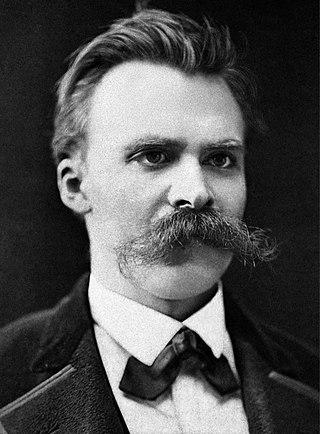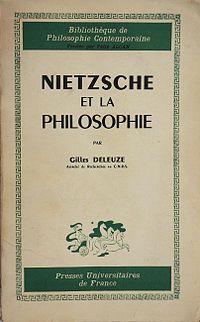Related Research Articles

Friedrich Wilhelm Nietzsche was a German classical scholar, philosopher, and critic of culture, who became one of the most influential of all modern thinkers. He began his career as a classical philologist before turning to philosophy. He became the youngest person to hold the Chair of Classical Philology at the University of Basel in Switzerland in 1869, at the age of 24, but resigned in 1879 due to health problems that plagued him most of his life; he completed much of his core writing in the following decade. In 1889, at age 44, he suffered a collapse and afterward a complete loss of his mental faculties, with paralysis and probably vascular dementia. He lived his remaining years in the care of his mother until her death in 1897, and then with his sister Elisabeth Förster-Nietzsche. Nietzsche died in 1900, after experiencing pneumonia and multiple strokes.

Gilles Louis René Deleuze was a French philosopher who, from the early 1950s until his death in 1995, wrote on philosophy, literature, film, and fine art. His most popular works were the two volumes of Capitalism and Schizophrenia: Anti-Oedipus (1972) and A Thousand Plateaus (1980), both co-written with psychoanalyst Félix Guattari. His metaphysical treatise Difference and Repetition (1968) is considered by many scholars to be his magnum opus.

Henri-Louis Bergson was a French philosopher who was influential in the traditions of analytic philosophy and continental philosophy, especially during the first half of the 20th century until the Second World War, but also after 1966 when Gilles Deleuze published Le Bergsonisme. Bergson is known for his arguments that processes of immediate experience and intuition are more significant than abstract rationalism and science for understanding reality.
Continental philosophy is an umbrella term for philosophies prominent in continental Europe. Michael E. Rosen has ventured to identify common themes that typically characterize continental philosophy. These themes proposed by Rosen derive from a broadly Kantian thesis that knowledge, experience, and reality are bound and shaped by conditions best understood through philosophical reflection rather than exclusively empirical inquiry.
Élan vital is a term coined by French philosopher Henri Bergson in his 1907 book Creative Evolution, in which he addresses the question of self-organisation and spontaneous morphogenesis of things in an increasingly complex manner. Élan vital was translated in the English edition as "vital impetus", but is usually translated by his detractors as "vital force". It is a hypothetical explanation for evolution and development of organisms, which Bergson linked closely with consciousness – the intuitive perception of experience and the flow of inner time.

Difference and Repetition is a 1968 book by French philosopher Gilles Deleuze. Originally published in France, it was translated into English by Paul Patton in 1994.
Affect is a concept, used in the philosophy of Baruch Spinoza and elaborated by Henri Bergson, Gilles Deleuze and Félix Guattari, that places emphasis on bodily or embodied experience. The word affect takes on a different meaning in psychology and other fields.
Multiplicity is a philosophical concept developed by Edmund Husserl and Henri Bergson from Riemann's description of the mathematical concept. In his essay The Idea of Duration, Bergson discusses multiplicity in light of the notion of unity. Whereas a unity refers to a given thing in as far as it is a whole, multiplicity refers to the "parts [of the unity] which can be considered separately." Bergson distinguishes two kinds of multiplicity: one form of multiplicity refers to parts which are quantitative, distinct, and countable, and the other form of multiplicity refers to parts that are qualitative, which interpenetrate, and which each can give rise to qualitatively different perception of the whole.
Christopher Janaway is a philosopher and author. He earned degrees from the University of Oxford. Before moving to Southampton in 2005, Janaway taught at the University of Sydney and Birkbeck, University of London. His recent research has been on Arthur Schopenhauer, Friedrich Nietzsche and aesthetics. His 2007 book Beyond Selflessness: Reading Nietzsche's Genealogy focuses on a critical examination of Nietzsche's On the Genealogy of Morals. Janaway currently lectures at the University of Southampton.

Cinema 1: The Movement Image (1983) is the first of two books on cinema by the philosopher Gilles Deleuze, the second being Cinema 2: The Time Image (1985). Together Cinema 1 and Cinema 2 have become known as the Cinema books, the two volumes both complementary and interdependent. In these books the author combines philosophy and cinema, explaining in the preface to the French edition of Cinema 1 that "[t]his study is not a history of cinema. It is a taxonomy, an attempt at the classifications of images and signs"; and that the "first volume has to content itself with […] only one part of the classification". To make this division between the movement-image and the time-image Deleuze draws upon the work of the French philosopher Henri Bergson's theory of matter (movement) and mind (time).
Todd Gifford May is a political philosopher who writes on topics of anarchism, poststructuralism, and post-structuralist anarchism. More recently he has published books on existentialism and moral philosophy. He is currently a professor of philosophy at Warren Wilson College.

The Dawn of Day or Dawn or Daybreak is an 1881 book by the German philosopher Friedrich Nietzsche. According to the Nietzsche scholar Keith Ansell-Pearson, it is the least studied of all of Nietzsche's works. This relative obscurity is mostly due to the greater attention paid to his subsequent writings.

Nietzsche and Philosophy is a 1962 book about Friedrich Nietzsche by the philosopher Gilles Deleuze, in which the author treats Nietzsche as a systematically coherent philosopher, discussing concepts such as the will to power and the eternal return. Nietzsche and Philosophy is a celebrated and influential work. Its publication has been seen as a significant turning-point in French philosophy, which had previously given little consideration to Nietzsche as a serious philosopher.
Virtuality is a concept with a long history in philosophy, its most notable recent version being that developed by French thinker Gilles Deleuze.

Leonard "Len" Lawlor is Edwin Erle Sparks Professor of Philosophy at Pennsylvania State University. He specializes in nineteenth- and twentieth-century Continental philosophy.
Keith Wylie Faulkner is a British academic specializing in the work of Gilles Deleuze. He received his Ph.D in philosophy from the University of Warwick, UK. He is known for authoring Deleuze and the Three Syntheses of Time on Deleuze's theory of time, which he calls the most important theory of time since Heidegger.
You Must Change Your Life is a 2009 book by the German philosopher Peter Sloterdijk about the history and philosophy of practice across the planet as well as the development of anthropotechnics.

Cinema 2: The Time-Image (1985) is the second volume of Gilles Deleuze's work on cinema, the first being Cinema 1: The Movement-Image (1983). Cinema 1 and Cinema 2 have become to be known as the Cinema books, and are complementary and interdependent texts.

Daniel W. Smith is an American philosopher, academic, researcher, and translator. He is a professor in the Department of Philosophy at Purdue University, where his work is focused on 19th and 20th century continental philosophy.
References
- ↑ "Keith Ansell-Pearson". grantabooks.com. Granta Books. Archived from the original on 11 September 2015. Retrieved 14 July 2015.
- 1 2 "Keith Ansell-Pearson". warwick.ac.uk. University of Warwick. Archived from the original on 14 July 2015. Retrieved 13 July 2015.
- ↑ Ansell-Pearson, Keith (2012). Germinal Life: The Difference and Repetition of Deleuze. London: Routledge. p. 1. ISBN 978-1134671199.